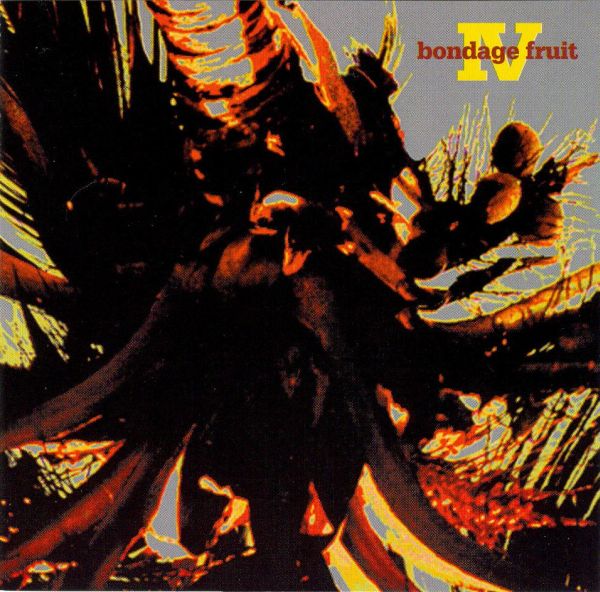
Exposé Online
What's old
Exposé print issues (1993-2011)
- 1 (October 1993)
- 2 (February 1994)
- 3 (May 1994)
- 4 (August 1994)
- 5 (October 1994)
- 6 (March 1995)
- 7 (July 1995)
- 8 (November 1995)
- 9 (March 1996)
- 10 (August 1996)
- 11 (February 1997)
- 12 (May 1997)
- 13 (October 1997)
- 14 (February 1998)
- 15 (July 1998)
- 16 (January 1999)
- 17 (April 1999)
- 18 (November 1999)
- 19 (May 2000)
- 20 (October 2000)
- 21 (March 2001)
- 22 (July 2001)
- 23 (December 2001)
- 24 (April 2002)
- 25 (September 2002)
- 26 (February 2003)
- 27 (August 2003)
- 28 (December 2003)
- 29 (April 2004)
- 30 (September 2004)
- 31 (March 2005)
- 32 (September 2005)
- 33 (May 2006)
- 34 (March 2007)
- 35 (January 2008)
- 36 (October 2008)
- 37 (July 2009)
- 38 (July 2010)
- 39 (Summer 2011)
Reviews
Bondage Fruit — IV
(Musea GA 8627.AR, 1999, CD)
by Peter Thelen, Published 2000-05-01

After a mildly disappointing third album, Bondage Fruit is back in top form. Over the top, in fact. Much of this is insanely complex music that one might swear is all improvised, at least until the band hits a stop or a change and your jaw drops in awe. Folks attending last year’s Progfest in San Francisco got a taste of what to expect here. The band – guitar, bass, violin, drums, and a mallet percussionist, typically builds slowly, at first skeletally, building the density over irregular grooves, trading off violin and guitar solos – sometimes multi-tracked, peppered with vibraphone and percussives. On “Screen Game (Electric)” the rhythm guitar takes on a raw bluesy feel (with slide and effects-distortion) while the lead guitar and violin duel in the foreground. There are two versions of “Screen Game” – the aforementioned electric version with uncredited harmonica solo is only available on the Japanese version, while the Musea release features an equally impressive acoustic version; otherwise the two discs are identical. The dreamy twelve minute “Storm Bird Storm Dreamer,” which the band opened with in San Francisco, sounds far better here when the sound is properly mixed, and in fact may be one of the album’s best tracks. The overt zeuhl influences of the early albums have faded in favor of a stark and stunning originality that’s pretty much theirs alone. The 20-minute apocalyptic “Sono Bank” pretty much sums up where Bondage Fruit is today: an ‘evolving groove’ is driven by densely layered blistering multi-tracked guitars and violin through a number of changes to an intense cacaphonic climax. Headphone music, for sure. My highest recommendation.
Filed under: New releases, Issue 19, 1999 releases
Related artist(s): Yuji Katsui, Natsuki Kido, Bondage Fruit
What's new
These are the most recent changes made to artists, releases, and articles.
- Review: Sterbus - Black and Gold
Published 2026-03-03 - Release: Janel Leppin's Ensemble Volcanic Ash - Pluto in Aquarius
Updated 2026-03-02 15:06:51 - Release: Janel Leppin - Slowly Melting
Updated 2026-03-02 15:05:27 - Release: Alister Spence - Always Ever
Updated 2026-03-02 15:04:11 - Release: Let Spin - I Am Alien
Updated 2026-03-02 15:02:41 - Review: Falter Bramnk - Vinyland Odyssee
Published 2026-03-02 - Review: Exit - Dove Va la Tua Strada?
Published 2026-03-01 - Review: Steve Tibbetts - Close
Published 2026-02-28 - Release: We Stood Like Kings - Pinocchio
Updated 2026-02-27 19:24:02 - Release: Stephen Grew - Pianoply
Updated 2026-02-27 19:20:11 - Release: Thierry Zaboitzeff - Artefacts
Updated 2026-02-27 00:16:46 - Review: Kevin Kastning - Codex I & Codex II
Published 2026-02-27 - Release: Zan Zone - The Rock Is Still Rollin'
Updated 2026-02-26 23:26:09 - Release: The Leemoo Gang - A Family Business
Updated 2026-02-26 23:07:29 - Release: Ciolkowska - Bomba Nastoyashchego
Updated 2026-02-26 13:08:55 - Review: Immensity Crumb - Chamber Music for Sleeping Giants
Published 2026-02-26 - Release: The Gatekeepers - Diary of a Teenage Prophet
Updated 2026-02-25 15:55:58 - Listen and discover: Mordecai Smyth will not break your back
Published 2026-02-25 - Review: Mars Lasar - Grand Canyon
Published 2026-02-25
